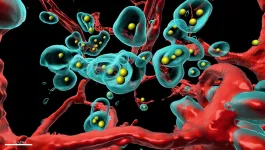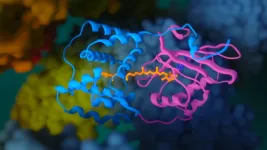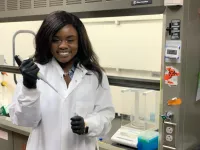Parts of Greenland may be on the verge of tipping: New early-warning signals detected
2021-05-17
(Press-News.org) Scientists have detected new early-warning signals indicating that the central-western part of the Greenland Ice Sheet may undergo a critical transition relatively soon. Because of rising temperatures, a new study by researchers from Germany and Norway shows, the destabilization of the ice sheet has begun and the process of melting may escalate already at limited warming levels. A tipping of the ice sheet would substantially increase long-term global sea level rise.
"We have found evidence that the central-western part of the Greenland ice sheet has been destabilizing and is now close to a critical transition," explains lead author Niklas Boers from the Potsdam Institute for Climate Impact Research (PIK) and the Free University, Berlin, Germany. "Our results suggest there will be substantially enhanced melting in the future - which is quite worrying."
A key mechanism determining the overall stability of the Greenland ice sheet is the melt-elevation feedback. Essentially, increasing temperatures causes melting, which reduces the ice sheet's height. On a mountain, it's cold on top and less cold at the bottom. Hence, as the ice sheet's surface is melting, it sinks into lower, warmer surrounding air - which in turn leads to accelerated melting and additional height loss - a vicious circle. "This mechanism is long known, and it is one of the prime suspects for the detected destabilization of the central-western parts of the Greenland ice sheet. But we cannot exclude that other feedbacks, for example related to the albedo of the ice sheet, play an important role too," Boers explains.
Unsettling warning signs
For their analysis Boers and his co-author Martin Rypdal from the Arctic University of Norway factored in sea-level temperatures from weather stations, melt intensities from ice cores in central-west Greenland, as well as corresponding computer model simulations - and found unsettling early warning signs in the fluctuations of ice sheet heights, suggesting that a tipping of this part of the ice sheet is approaching. "The warning signs are caused by characteristic changes in the dynamics of the Greenland ice sheet, which reflect how well the ice sheet can resist against and recover from disruptions", Rypdal explains.
According to previous model results the melting of Greenland Ice Sheet is inevitable beyond a critical global mean temperature brink ranging from 0.8 to 3.2 degrees Celsius above pre-industrial levels. Once this threshold is crossed, the whole ice sheet could melt entirely over hundreds or thousands of years, potentially leading to a global sea-level rise of more than 7 meters and a collapse of the Atlantic Meridional Overturning Circulation (AMOC), which is responsible for the relative warmth in Europe and North America. But in addition to several positive feedbacks that accelerate melting, there exist negative feedbacks that might stabilize the Greenland ice sheet at intermediate heights levels, mostly via increasing accumulation. "We urgently need to better understand the interplay of the different positive and negative feedback mechanisms that determine the current stability and the future evolution of the ice sheet", says Boers.
The future of the ice sheet is uncertain
The study suggests that at least in the central-western part of the Greenland ice sheet a critical temperature threshold is close. Yet how this affects the ice sheet as a whole remains unclear: "Given the signs we detect in ice cores from the central-western part, we have to increase our efforts to gather more observation and to increase our understanding of the mechanisms at play, for more reliable estimates of the future evolution of the Greenland ice sheet," says Rypdal. "The main problem is the so-called hysteresis," Boers continues. "Regardless of the precise interplay of the different feedbacks, we would have to considerably reduce temperatures below pre-industrial to get back to the ice sheet height levels of the last centuries. So practically, the current and near-future mass loss will be largely irreversible. That's why it is high time we rapidly and substantially reduce greenhouse gas emissions from burning fossil fuels and re-stabilize the ice sheet and our climate."
INFORMATION:
Article: Niklas Boers & Martin Rypdal (2021): Critical slowing down suggests that the western Greenland ice sheet is close to a tipping point. PNAS. DOI: 10.1073/pnas.2024192118.
ELSE PRESS RELEASES FROM THIS DATE:
2021-05-17
A new technology developed by UZH researchers enables the body to produce therapeutic agents on demand at the exact location where they are needed. The innovation could reduce the side effects of cancer therapy and may hold the solution to better delivery of Covid-related therapies directly to the lungs.
Scientists at the University of Zurich have modified a common respiratory virus, called adenovirus, to act like a Trojan horse to deliver genes for cancer therapeutics directly into tumor cells. Unlike chemotherapy or radiotherapy, this approach does no harm to normal healthy cells. Once inside tumor cells, the delivered genes serve as a blueprint for therapeutic ...
2021-05-17
When doctors or scientists want to peer into living tissue, there's always a trade-off between how deep they can probe and how clear a picture they can get.
With light microscopes, researchers can see submicron-resolution structures inside cells or tissue, but only as deep as the millimeter or so that light can penetrate without scattering. Magnetic resonance imaging (MRI) uses radio frequencies that can reach everywhere in the body, but the technique provides low resolution -- about a millimeter, or 1,000 times worse than light.
A University of California, Berkeley, researcher has now shown that microscopic ...
2021-05-17
PHILADELPHIA and MELBOURNE, Australia -- (May. 17, 2021) -- A team of scientists from The Wistar Institute in Philadelphia and the Peter MacCallum Cancer Center in Melbourne, Australia, discovered a new checkpoint mechanism that fine-tunes gene transcription. As reported in a study published in Cell, a component of the Integrator protein complex tethers the protein phosphatase 2A (PP2A) to the site of transcription allowing it to stop the activity of the RNA polymerase II enzyme (RNAPII). Disruption of this mechanism leads to unrestricted gene transcription and is implicated in cancer.
The study points to new viable opportunities for therapeutic ...
2021-05-17
Exposure to light is compulsory for photosynthetic organisms for the conversion of inorganic compounds into organic ones. However, if there is too much solar energy, the photosystems and other cell components could be damaged. Thanks to special protective proteins, the overexcitation is converted into heat - in the process called non-photochemical quenching. The object of the published study, OCP, was one of such defenders. It was first isolated in 1981 from representatives of the ancient group of photosynthetic bacteria, ?yanobacteria. OCP comprises two domains forming a cavity, in which a carotenoid pigment is embedded.
"When light is absorbed by the carotenoid molecule, OCP can change from an inactive orange to an active red form. ...
2021-05-17
For much of the nation's food supply, removing unsafe products off of store shelves can take up to 10 months, according to news reports -- even when people are getting sick.
The growing complexity and scope of modern supply chains result in painfully slow product recalls, even when consumer well-being is at stake. For example, in 2009, salmonella-tainted peanuts killed nine people and sickened more than 700 in 46 states, and the resulting nationwide recall cost peanut farmers, their wholesale customers and retailers more than $1 billion in lost production ...
2021-05-17
Viruses attack the body by sending their genetic code -- DNA and RNA -- into cells and multiplying. A promising class of therapeutics that uses synthetic nucleic acids to target and shut down specific, harmful genes and prevent viruses from spreading is gaining steam.
However, only a handful of siRNA, or other RNA interference-based therapeutics have been approved. One of the main problems is getting the siRNA into the body and guiding it to the target.
Chemical engineering researchers in the Cockrell School of Engineering aim to solve that problem, while improving the targeting effectiveness of siRNA. In a new paper in the Journal of Controlled Release, the researchers created several different types of nanoparticles and analyzed them for the ability to deliver and protect siRNA from ...
2021-05-17
May 17, 2021 - Amid the rising toll of opioid overdoses and deaths in the U.S., several states are considering laws enabling civil commitment for involuntary treatment of patients with substance use disorders (SUDs). Most addiction medicine physicians support civil commitment for SUD treatment - but others strongly oppose this approach, reports a survey study in Journal of Addiction Medicine, the official journal of the American Society of Addiction Medicine (ASAM). The journal is published in the Lippincott portfolio by Wolters Kluwer.
"Civil commitment has emerged as a sometimes compelling yet controversial policy option," according to the new study, led by Abhishek Jain, MD. At the time of ...
2021-05-17
Some 16 million Americans are believed to have alcohol use disorder, and an estimated 93,000 people in the U.S. die from alcohol-related causes each year. Both of those numbers are expected to grow as a result of heavier drinking during the COVID-19 pandemic.
Yet, in a new study involving data from more than 200,000 people with and without alcohol problems, researchers at Washington University School of Medicine in St. Louis found that although the vast majority of those with alcohol use disorder see their doctors regularly for a range of issues, fewer than one in 10 ever get treatment for drinking.
The findings are published in the June issue of the journal Alcoholism: Clinical & Experimental Research.
Analyzing data gathered from 2015 through 2019 via the National ...
2021-05-17
In a world that's changing fast, the Long Term Ecological Research (LTER) Network can seem almost an anachronism. Yet the patience and persistence that have generated 40 years of careful, reliable science about the Earth's changing ecosystems may prove to be just what's needed in this rapidly shifting world. We can't wait for a crystal ball -- and we don't have to. By harnessing decades of rich data, scientists are beginning to forecast future conditions and plan ways to manage, mitigate, or adapt to likely changes in ecosystems that will impact human economies, health and wellbeing.
The National Science Foundation established the LTER Network more than 40 years ago to provide an alternative to funding models that favored constant innovation over continuity. The model has proven to be extraordinarily ...
2021-05-17
An international study has found that four out of five women in prison in Scotland have a history of head injury, mostly sustained through domestic violence. Published recently in The Lancet, researchers, including SFU psychology graduate student Hira Aslam, say the study has important implications for the female prison population more broadly and could help to inform mental health and criminal justice policy development.
"The findings are incredibly sobering," says Aslam. "While we anticipated that the incidence of head injuries among women who are involved in the criminal justice system would be high, these estimates exceeded our expectations."
Researchers also found that violent criminal behaviour was three times more likely among women who had a history of significant head injury, ...
LAST 30 PRESS RELEASES:
[Press-News.org] Parts of Greenland may be on the verge of tipping: New early-warning signals detected






